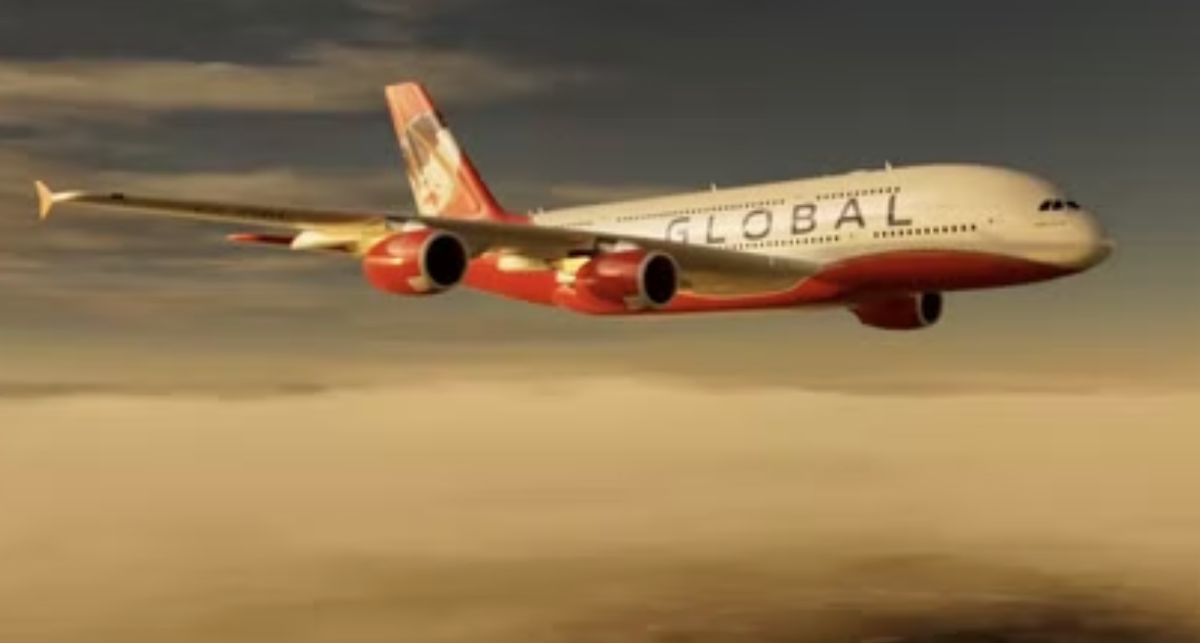Meet the new airline buying up super jumbo jets for cheap to offer flights across the Atlantic

- Oops!Something went wrong.Please try again later.
A new start-up, Global Airlines, will succeed because passengers, pilots and airports love the Airbus A380: that is the claim from James Asquith, the travel entrepreneur who is creating the new long-haul carrier.
“Everyone says that something can't be done until it's done,” he told The Independent.
Mr Asquith, 34, believes that the world’s biggest airliner will attract passengers and staff even in a highly competitive market. His business plan relies on buying up secondhand A380s at very low prices.
The double-deck jet has not been a commercial success, with far fewer sales than the Boeing 747. By far the biggest operator is Emirates, with more than half the European-built “SuperJumbos” in service. But Air France has retired its fleet of the plane, some of which are being stored at Lourdes airport in southwest France. Other A380s at the end of their initial 10-year leases have been handed back. As a result, the pre-owned jets are going cheap.
Global Airlines bought its first aircraft – of an initial fleet of four – from a German aircraft finance company, Doric Aviation. The price has not been revealed, but is believed to be in the low tens of millions of dollars.
Mr Asquith said: “By not paying $275m plus for an A380, our break-even point is much, much lower.
“Interest and depreciation on a ticket is around 40 per cent of the cost to pay that aircraft back over 15 to 20 years.
“It's a significant chunk of the fee that we've taken out. No lessors, no guns against our head, no debt.
“That allows us to be able to add more in terms of the product and there's more headroom in terms of pricing as well.”
Global Airlines has yet to announce a launch date or confirm destinations, but the founder says the airline could be flying “sooner than you think”. It has teamed up with a Portugal charter carrier, HiFly, which has experience of operating the A380 – and the required licences.
“We're where we need to be,” Mr Asquith said. “The ‘return to service’ work on our first aircraft is almost complete – in the 90 per cent range.”
The main focus will be on transatlantic flying, but the founder promises “some other things – we’ll be revealing all of that pretty shortly”.
Many aviation industry insiders have questioned Global Airlines’ chances of a start-up successfully filling seats on the world’s biggest passenger plane – in a crowded market where existing “legacy” carriers have strong loyalty programmes and networks offering connections.
Critics also point to the high cost of fuelling, crewing and maintaining the giant jet.
“There's obviously challenges with the aircraft,” said Mr Asquith. “Everyone knows that. But there's also huge benefits for passengers.
“It’s a passenger favourite. It’s a crew favourite. It’s a pilot favourite. And obviously an airport favourite as well. People want the largest commercial aircraft in the world.
“If I knew all the challenges with the A380 and what we are doing now, at the start, I wouldn't have changed anything that we're doing.
“The product is what we can do with the A380.”
The carrier makes the bold claim of “revolutionising commercial flying”. Its online pitch reads: “We’ve all suffered for far too long with long security queues, late flights, lost luggage, inedible food and constant poor customer service.
“Global Airlines offers fast relief from the aches and pains associated with commercial air travel. We bring joy at every interaction and delight at every touch point. Take a deep breath, welcome aboard.
“Whether you are flying for business or leisure, Global Airlines do things differently. From catering and customer relations through to scheduling and ground operations. Simply put we are unconstrained by the usual aviation paradigms.”
One constraint Global Airlines will not be able to avoid: recruiting staff. British Airways’ parent company, IAG, recently warned: ”Shortages of licenced engineers with aircraft experience across the aviation sector and in the Group’s airlines combined with aircraft, engines and component shortages are significantly impacting maintenance delivery timelines and may challenge morale.”
But Mr Asquith says: “Crew want very simple things. They want flexibility, they want a good work environment, and yes, of course, good pay and not being overworked.
“I’ve got literally thousands of people in my inbox asking when they can apply to come and work with us.
“It's about creating a culture, creating somewhere that people love to work.
“The beauty of, in the Seventies, of someone putting on a Pan Am or a TWA uniform and going to work and feeling like a million damn dollars walking through the airport.
“That's what it could and should be.”
Listen to James Asquith in the daily travel podcast from The Independent

